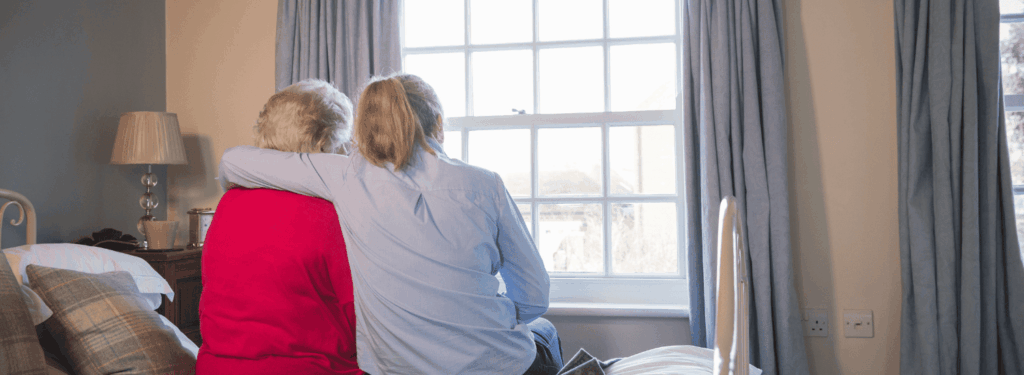Understanding Dementia: A Q&A with Admiral Nurse Jane Pritchard
This Dementia Action Week, we asked Dr Jane Pritchard, our experienced in-house Ad miral Nurse to share her insights on dementia, the importance of early diagnosis, and the support available. Here’s what she had to say:
miral Nurse to share her insights on dementia, the importance of early diagnosis, and the support available. Here’s what she had to say:
1. What exactly is an Admiral Nurse, and how does The Good Care Group support individuals with dementia?
As an Admiral Nurse, I’m a specialist dementia care nurse. The Good Care Group provides live-in care, which means a dedicated carer lives in the person’s home. This allows individuals with dementia to remain in their familiar surroundings, close to loved ones and their community.
2. Why is it so important to raise awareness about dementia, especially during Dementia Action Week?
Dementia affects nearly a million people in the UK, and it’s crucial to increase understanding of this condition. Raising awareness helps to reduce stigma, encourage people to seek help, and promotes early diagnosis, which can significantly improve outcomes.
3. Could you explain what dementia is and highlight some of the early warning signs?
Dementia is an umbrella term for a range of conditions that affect the brain, impacting cognitive abilities and decision-making. While the risk increases with age, it’s not a normal part of aging. Early signs can include short-term memory loss (like forgetting appointments), getting lost or disorientated, and difficulty finding the right words or names.
4. What are some common misconceptions about dementia that you’d like to address?
One common myth is that there’s no point in getting a diagnosis because nothing can be done. However, research shows that people want to know, and an early diagnosis allows for better planning, access to support, and even medication for some types of dementia. Another misconception is that dementia is just “senility” – this is not true, dementia is a medical condition, not an inevitable part of aging.
5. What are the benefits of receiving a timely dementia diagnosis?
A diagnosis empowers individuals to make choices about their future, access vital support services for themselves and their families, and potentially benefit from available medications and opportunities to participate in research. People with a diagnosis also tend to have shorter hospital stays and may be entitled to benefits and carer support.
6. What should someone do if they are worried about their memory or noticing dementia-like symptoms?
The first step is to talk to your GP. It can be helpful to bring someone with you who may have noticed things you haven’t. Don’t hesitate to ask for a longer appointment and consider writing down your concerns beforehand.
7. What does the diagnostic process typically involve after speaking with a GP?
The GP will take a history and may conduct some initial memory tests and a physical examination, including blood tests to rule out other causes. If further investigation is needed, they will refer you to a local memory assessment service or dementia team for a more detailed assessment, which might include brain scans.
8. What kind of support is available after receiving a dementia diagnosis?
Support is available through the local authority, which can conduct financial and needs assessments and help with appointing care agencies if needed. Charities like the Alzheimer’s Society and Dementia UK offer invaluable information, advice, and helplines. Dementia UK’s helpline even has Admiral Nurses available for specialist advice and emotional support.
9. How can people continue to live well with dementia?
It’s crucial to remember that a good quality of life is still possible with dementia. Early diagnosis makes it easier to achieve this by enabling access to the right support and strategies.
10. What is the key message you want to share during Dementia Action Week?
During Dementia Action Week, we urge people to learn more about dementia, understand how to get help, and know how to support those affected. Please visit the Alzheimer’s Society and Dementia UK websites for further information.

Content reviewed by Dr Jane Pritchard
Thu 08 May 2025Dr Jane Pritchard is a consultant Admiral Nurse who specialises in the care and support of those living with dementia. She is a registered nurse with the Nursing and Midwifery Council specialising in mental health. She has over 20 years’ experience working in care and has authored several publications on dementia care.
View full profileDiscover more
5 winter warming tips for older people
Help your loved one stay safe and comfortable throughout the colder months with our list of the most effective winter warming tips for older people. With the coldest part of the year soon to be upon us, we’ve prepared this...
Read moreQuestions to ask when choosing home care in 2026
Choosing care for another person – whether it’s a friend or a family member – is never an easy decision. With so many care options available, and plenty of considerations to make along the way, the process can feel overwhelming...
Read moreHelping families in Scotland recognise the early signs of dementia
The NHS is encouraging families to be alert to subtle early signs of dementia, particularly during times when loved ones spend more time together. Increased awareness can help ensure people receive the right support and assessment as early as possible....
Read moreRead why our clients choose us
Awards & accreditations
Talk to us about your care needs
To talk about your care needs, contact one of our friendly advisors.
Calls from landlines are free.












